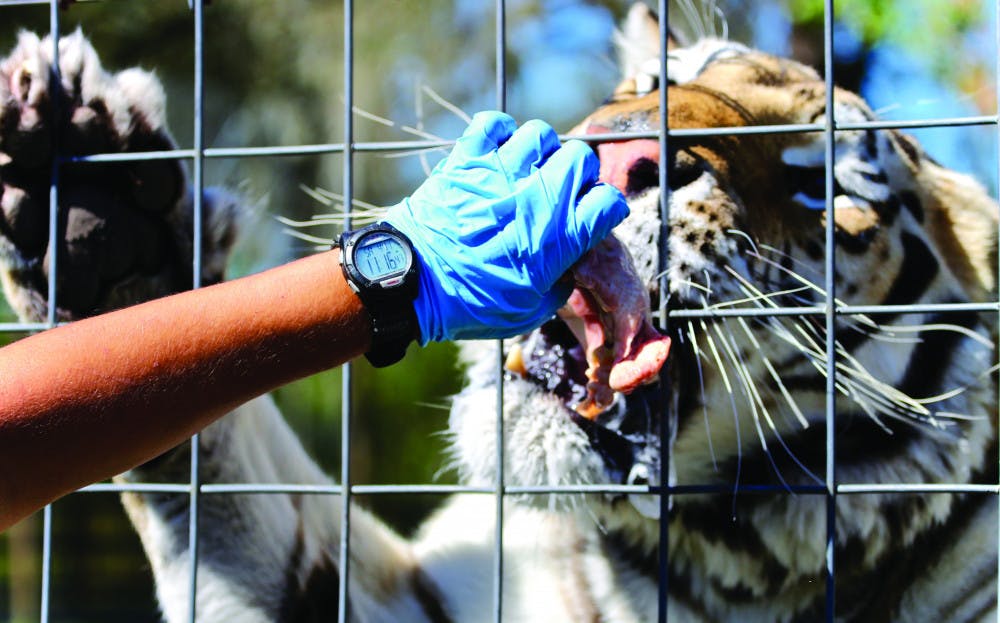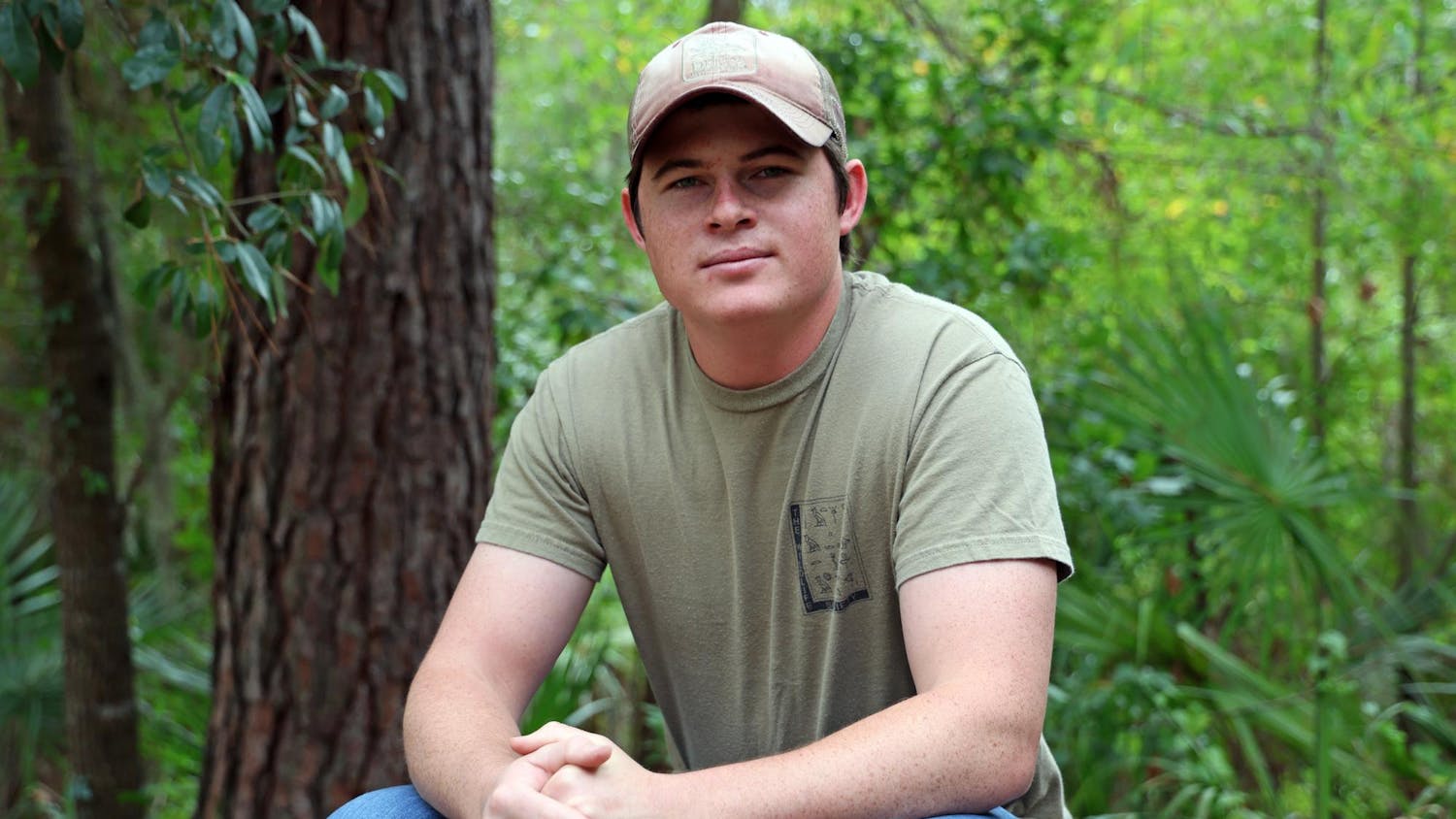In front of an audience, Gator lunged.
His claws scraped the top of the 14-foot-tall fence, stretching eight feet of orange and black stripes. To a chorus of gasps and murmurs, he snapped the piece of chicken from his keeper’s hand.
“Amazing,” one woman said, gasping in astonishment.
About six years ago, Gator, a tiger rescued from a roadside zoo in Chiefland, Florida, was 9 months old and 65 pounds, barely half the appropriate weight, with bleeding ulcers after a diet of just milk. But under the care of Barry Janks and Christine Janks at the Carson Springs Wildlife Conservation Foundation, he’s now 7 years old and 500 pounds, pouncing on pieces of chicken and swimming in his own waterhole.
“That’s your commitment,” Barry said. “If you can’t do what’s right for the animal, why do you take them?”
It costs anywhere from $250,000 to $300,000 annually for the couple to treat their 80 animals — tigers, lions and hyenas among them — right. That’s why on Saturday, they’re hosting their biannual open house for thousands to freely roam the conservation at 8528 E. County Road 225. The profits from the ticket sales — $5 to $10 depending on age — from the event account for at least $25,000 for their annual budget.
“Everybody’s always shocked when they come here,” Barry said.
“It’s amazing, people all over the world come here.”
• • •
It started with horses.
Barry, now 61, moved with Christine to Florida from Chicago in 1999 after retiring as a jockey agent. There, the couple began to train and breed horses on the 274-acre property in Gainesville that used to belong to Christine’s father.
In 2007, a friend from Oklahoma called. She could no longer afford to take care of Tocatta, her pet serval — a wild African cat distantly related to the lynx — and knowing how large the Janks’ property was, she asked if they could take the cat in.
“I had no idea what to do,” Barry said. “I only knew horses.”
But they took Tocatta in anyway. The next year, they took in four more animals: Sheena, a bobcat, Jay and Mocha, two cougars, and Gracie, a giraffe.
Since then, the couple has allocated 80 acres of their property for more exotic animals to stay. State and national organizations have reached out to the couple to let them know if they’ve found an exotic animal in need of help or close to euthanization.
The Janks found one cougar, Myra, with a choker embedded in her neck after being chained by her previous owner. Florida Fish and Wildlife Conservation Commission officials didn’t think the then-13-year-old cougar would make it through another month. But she lived another three years under the conservation’s care.
Samer the tiger, who still lives at Carson Springs, couldn’t pick up his tail to urinate or climb into a standing position when he first arrived, traumatized from a cramped cage he shared with lions. Now, Samer is pacing and flexing his muscles like the other tigers.
For head keeper Alex Gil, it’s clear that the couple has an intimacy with the animals that the rest of the staff can’t reach. In January, when Barry and Christine took an overnight trip to Savannah, Georgia, a keeper interrupted their vacation to call and say that at least six of the animals were upset without them there.
But Gil relishes the chance to interact with the friendly lions and his favorite species, the spotted hyena.
“I love doing this,” he said. “It’s my career.”
Barry’s favorite animal is Henry, a 4,600-pound Indian rhino, a peaceful old-timer who needs 70 arthritis pills every day. That’s who Barry feeds a healthy breakfast of hay, biotin, alfalfa, wheat, supplements and minerals first thing every morning at 7:30 a.m.
“I don’t have any kids, so these animals are (my kids),” Barry said. “They are part of the family.”
• • •
Finances present one of the biggest challenges for the couple.
On a nearly 300-acre property, there’s always room for another rescue. But when it costs $5,000 annually to feed a tiger that can live for 20 years, the couple often hesitates to take in additional animals.
Veterinarian visits also cut into the couple’s budget. Barry estimates he and his wife shell out $30,000 to $35,000 a year for checkups and vaccines.
So far, the couple relies on donations. They give tours every day of the week except Sunday, asking for a $25 donation in return. With roughly 40 to 50 visitors every day, Barry said, the funds make up 30 percent of their budget.
“The look on (visitors’) faces is great,” he said. “They are just so happy they got to do this.”
Joyce Bak, the woman in awe of Gator’s prowess, took one of the tours at Carson Springs for her birthday. Her daughter, 21-year-old UF public health junior Arella Bak, found out about the facility online and booked the tour for herself and her mother.
“I’ve never gotten so close to these types of animals,” Joyce said.
The conservation does smaller events for holidays like Christmas and Valentine’s Day, but the highlight of the year comes with the open houses each fall and spring.
Barry expects roughly 2,500 people to come for this Saturday’s Spring Safari Open House. From 10 a.m. to 3 p.m., families and individuals can visit the animals and watch warthog races and feedings. Ten percent of profits made by the food vendors — Cilantro Taco, Blue Highway and PDQ — will go back to paying for Carson Springs.
None of the profits from the facility go to Barry and Christine.
“Me and Christine will never take a penny,” Barry said. “We already made our living, and now we are just giving back.”
He’s unsure what will happen to the conservation when he and Christine die. Barry hopes he is buried at Carson Springs or his ashes are spread at the conservation.
But for now, he’s relishing the opportunity to spend time with his animals.
“When I come up to their cages, they all come running up,” Barry said. “The animals are happy here.”
Contact Meryl Kornfield at mkornfield@alligator.org and follow her on Twitter at @MerylKornfield
Head keeper Alex Gil, 29, feeds Gator, 7, a former photo cat who was underweight when rescued after only being fed milk. Gator was named after the Florida Gators.
Barry, 61, pets Henry, a 35-year old Asian rhino, after feeding a mix of carrots, sweet potatoes and apples.






